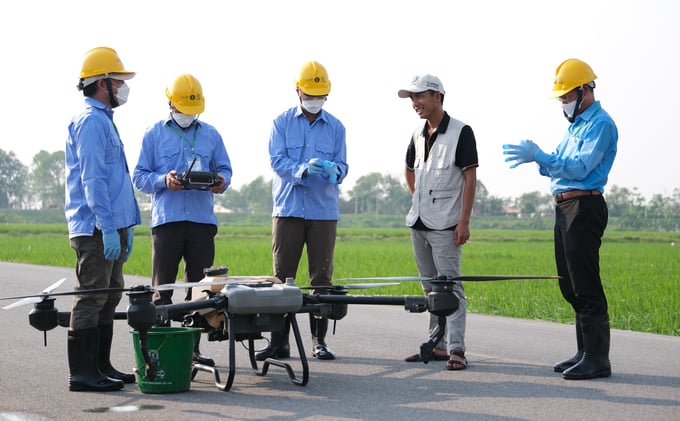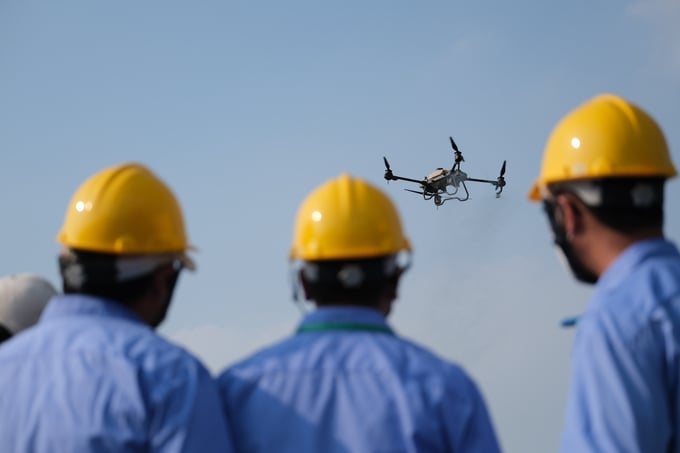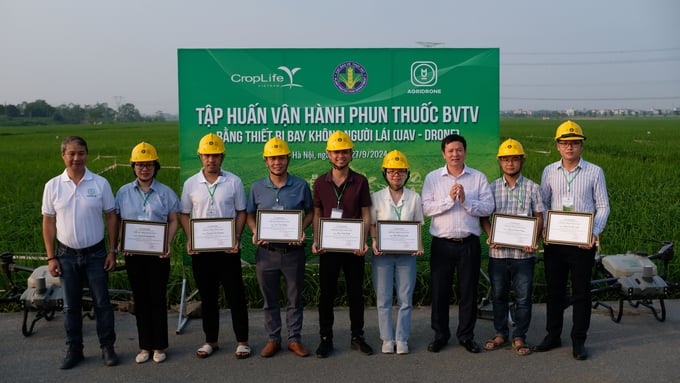November 19, 2025 | 01:15 GMT +7
November 19, 2025 | 01:15 GMT +7
Hotline: 0913.378.918
November 19, 2025 | 01:15 GMT +7
Hotline: 0913.378.918

Training course on pesticide spraying with drones for 30 officers from 14 organizations. Photo: Quynh Chi.
On September 27, the Plant Protection Department of the Ministry of Agriculture and Rural Development, in collaboration with the CropLife Vietnam Association and AgriDrone Vietnam Aviation Equipment Joint Stock Company, organized a training course on pesticide spraying using unmanned aerial vehicles (UAVs/Drones) for 30 officers representing 14 organizations nationwide.
This is the first training and certification program for officials involved in pesticide testing.
During the training, participants were updated on new regulations regarding pesticide testing with drones and received foundational knowledge about the operating principles of these flying devices in agricultural cultivation. Attendees also had the opportunity to conduct hands-on tests of drone operation for pesticide spraying in rice fields located in Thuy Lam commune, Dong Anh district, Hanoi.
The training program included support and technical guidance from AgriDrone Vietnam Aviation Equipment Joint Stock Company, management personnel from the Plant Protection Department, and technical experts from the CropLife Vietnam Association.

At the certification ceremony, Mr. Huynh Tan Dat, Director of the Plant Protection Department, expressed his hope that the trained officers would become instructors for their colleagues in the future. Photo: Quynh Chi.
During his speech at the training certification ceremony, Mr. Huynh Tan Dat stated that participating in these training sessions provides officers with the opportunity to familiarize themselves with unmanned aerial vehicles, which are applicable in various fields.
“The use of these devices in pesticide spraying has proven to be highly efficient, significantly enhancing the understanding of officers directly engaged in pesticide testing activities. Furthermore, these officers will also serve as lecturers or trainers for their colleagues in the future, assisting them in optimizing drone usage,” the Director emphasized.
According to the leader of the Plant Protection Department, the accuracy of drone applications offers numerous benefits to farmers. It helps save input costs, enhances human health, and improves the quality of agricultural products for both domestic consumption and export.

Spraying pesticides with drones saves water and increases spraying speed, while still ensuring comparable effectiveness in pest control. Photo: Quynh Chi.
When compared to manual spraying with backpack sprayers, using drones for pesticide application reduces water usage by over 90% and cuts costs by approximately 50%, all while maintaining equivalent - or even superior - effectiveness in pest control and achieving spraying speeds that are 30 times faster.
Currently, drones are utilized in agriculture across many countries worldwide. Common applications include mapping, crop inspection and monitoring, pesticide spraying, irrigation monitoring, and livestock grazing.
In early 2023, the Plant Protection Department announced the issuance of Basic Standard TCCS 830:2022/BVTV, which governs “Field Testing of Plant Protection Drugs for Preventing and Controlling Plant Pests Using Drones.” This standard is viewed as a significant legal and technical foundation for organizations conducting testing, enabling them to develop processes and utilize drones for pesticide spraying.
Since then, the use of pesticides has expanded, becoming more efficient and safer for farmers. This initial collaboration between the Plant Protection Department, CropLife Vietnam, and other partners is regarded as a stepping stone toward building a high-quality workforce. It is anticipated that, in the future, farmers will also gain access to standards and procedures for operating drones in pesticide application.

The Plant Protection Department and CropLife Vietnam awarded certificates for drone operation in pesticide spraying to technical staff. Photo: Quynh Chi.
According to Mr. Dang Van Bao, Chairman of CropLife Vietnam, drones represent not just a technological advancement, but also a solution that helps farmers gradually transition to smarter and more sustainable farming practices. This aligns with the government's and the Ministry of Agriculture and Rural Development's current strategy to promote high-tech agriculture.
At the event, the Plant Protection Department and CropLife Vietnam also unveiled a technical document titled “Safety Guidelines for Spraying Pesticides Using Drones,” which was developed collaboratively to disseminate and guide users on the principles and safety precautions associated with drone pesticide application.
The training course on Operating Spraying Pesticides Using Unmanned Aerial Vehicles is part of the first year of the Sustainable Pesticide Management Framework (SPMF) cooperation program between the Plant Protection Department and the CropLife Vietnam Association, aiming to promote the application of new technology in agricultural cultivation.
Translated by Quynh Chi

(VAN) Integrating agricultural extension activities with ecotourism development unlocks promising new avenues for localities boasting specific advantages in grape and apple cultivation.

(VAN) Enterprises and cooperatives accompany farmers in Tay Ninh to develop an organic seedless lime growing area, paving the way for poverty reduction.

(VAN) There were times when Pho faltered, yet his aspiration to bring the pure aroma to those who truly value clean tea kept urging him forward.

(VAN) Bich Thao Coffee Cooperative pioneered products achieving the national 5-star OCOP standard, paving the way for Son La coffee to conquer international markets.

(VAN) The Bao La bamboo-and-rattan cooperative has been producing goods integrated into value chains. As a result, its products have reached global markets.

(VAN) The training course in An Giang equips learners with emission verification methods, thus creating a basis for low-emission rice production.

(VAN) Thu Lum commune is focusing on developing medicinal plants under the forest canopy, creating sustainable livelihoods for local people, and contributing to protecting the ecological environment.